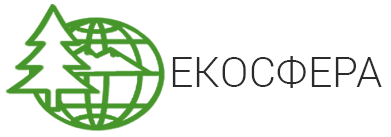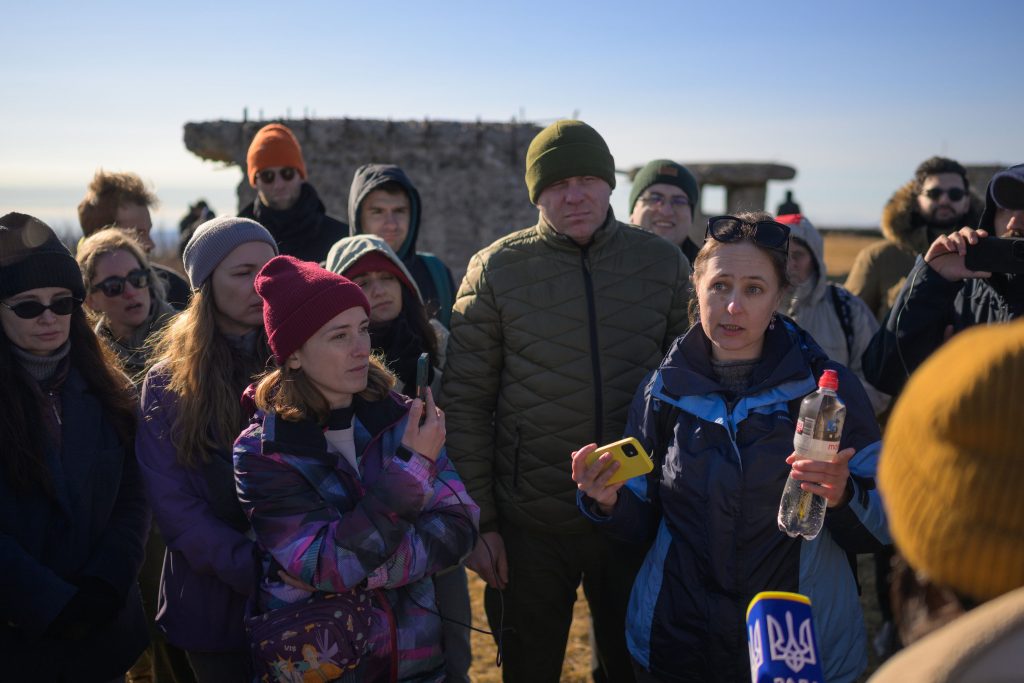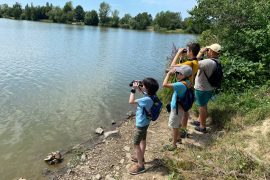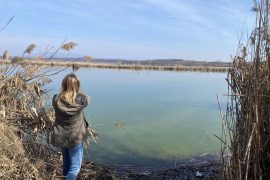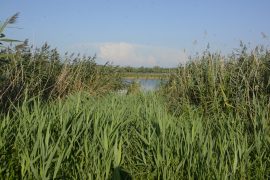Olena Mudra – investigative journalist and member of NGO «Ecosphere», was joined to additional event the Eighth Session Meeting of Parties to the Aarhus Convention, where she spoke about the persecution of activists which protect the highlands of Ukrainian Carpathians from destruction by wind energy projects. Oksana Stankevych-Volosyanchuk – Ph.D. and ecologist in «Ecosphere», also suffering from this persecution.
UN Women Europe and Central Asia Regional Office (ECARO) organized a side event to provide a high-level platform for amplifying the voices of Women Environmental Human Rights Defenders (WEHRDs) and demonstrate how the three pillars of the Aarhus Convention, which are access to information, public participation, and access to justice, can serve as powerful tools for advancing feminist climate justice.
The session highlighted intersectional risks faced by WEHRDs from Eastern Europe, the South Caucasus, and Central Asia, underscoring the urgent need for gender-responsive protection mechanisms and safer enabling environments for women’s participation in environmental decision-making. It examined the links between environmental protection, democratic rights, and gender equality, and to explore how the Aarhus Convention can be implemented in a gender-responsive manner to protect defenders, strengthen accountability, and counter shrinking civic space.
A total of 107 participants registered, and 36 activists and women led organizations from across the region attended the event.
The Recording of the meeting can be accessed here. (Passcode: aLew0RE^)
Highlights of the Session:
Opening Remarks
- Hanna Gunnarsson (Women Engaged for a Common Future) welcomed participants from across Europe and Central Asia, emphasizing that defending the environment increasingly means defending democratic rights. She noted the rise of gendered risks such as SLAPP lawsuits, intimidation, online abuse, and technology-facilitated gender-based violence. Hanna framed the discussion around the urgent need for solidarity and strategic use of the Aarhus Convention to safeguard defenders and ensure meaningful participation.
Aarhus Convention and UN Women’s Framework for Climate Justice
- Rebeca Acin Rivera, Regional Specialist for Humanitarian Action, Disaster Risk Reduction and Climate Change Adaptation at UN Women ECARO, provided an overview of the Aarhus Convention’s three pillars: Access to Information, Public Participation, and Access to Justice, stressing their practical implications for women and girls. She introduced UN Women’s Feminist Climate Justice Framework, structured around four Rs:
- Recognition of women’s knowledge and contributions
- Representation in decision-making spaces
- Redistribution of resources and opportunities
- Reparation for past and ongoing harms
- Accountability was highlighted as a cornerstone: commitments must be translated into action. Rebeca linked the discussion to global processes, including the seventieth session of the Commission on the Status of Women (CSW70)’s focus on access to justice and UN Women’s upcoming Progress of the World’s Women Report on climate justice.
Challenges and Strategies from the Region: Interventions from WEHRDs and experts from Eastern Europe, South Caucasus and Central Asia:
- Victoria Burnazyan, Vice-President of Ecolur Informational NGO, highlighted the persistent challenges for women environmental defenders in Armenia despite the country’s ratification of the Aarhus Convention in 2001. While the Convention provides rights to information and participation, implementation gaps remain. Women activists face systemic barriers and gendered risks, including SLAPP lawsuits and intimidation during public hearings, with no legal protections against such cases.
- Victoria stressed Armenia’s climate vulnerability, despite contributing only 0.02% of global emissions, where rural women struggle with water scarcity, heatwaves, and health risks. National adaptation plans exist, but local-level measures and information are lacking. She also raised concerns about legislation that allows businesses to withhold project risk details during hearings, undermining informed decisions and exposing activists to backlash. Despite efforts such as public tribunals and compliance submissions to the Aarhus Committee, progress has been limited. Victoria called for stronger gender-responsive regulations and protective mechanisms to safeguard environmental and human rights.
- Maria Kolesnikova, Chairwoman of MoveGreen, reflected on the evolving challenges for environmental activism in Kyrgyzstan. MoveGreen has successfully advanced air quality and climate change issues over the past eight years, making air pollution a national priority. However, recent political shifts and the adoption of “foreign agent” laws have restricted civic space, forcing organizations to self-censor and scale back independent monitoring efforts.
- Maria emphasized the gendered barriers women face in technical fields like environmental policy, where they must justify their expertise twice; first as activists and then as women. Despite these challenges, women have built resilient networks such as Green Alliance and regional climate action coalitions. She noted that while the Aarhus Convention remains a vital legal tool, its implementation is weak, and defenders lack rapid protection mechanisms. Maria called for stronger accountability, inclusive participation, and funding for grassroots initiatives, stressing that women’s leadership transforms environmental debates from technical reports into community-centered solutions.
- Olena Mudra, freelance investigative journalist, described the heightened risks faced by women defenders and journalists in Ukraine amid the ongoing war. She shared how speaking out against environmental harm and extractive projects has led to severe backlash, including smear campaigns, online harassment, and threats targeting her family. These tactics aim to silence activists and divert their time from environmental advocacy.
- Olena emphasized that conflict conditions exacerbate restrictions on access to information and freedom of expression, creating a hostile environment for accountability. Despite these challenges, she continues to advocate for transparency and environmental justice, calling for stronger international solidarity and protective mechanisms to ensure defenders can operate safely during and after the war.
Plenary Discussion:
Plenary Discussion focused on practical steps to strengthen protections for women environmental defenders and improve Aarhus Convention implementation. Participants highlighted legal and institutional gaps, stressing the need for gender-responsive frameworks and anti-SLAPP regulations to safeguard freedom of speech. Accountability emerged as a key concern: rights under Aarhus often remain “on paper,” requiring stronger enforcement and rapid response mechanisms for defenders under threat.
The discussion underscored the importance of networks and solidarity, calling for women-led coalitions and safe spaces for mutual support. Funding and capacity-building were identified as critical to enable grassroots action and community-level monitoring. Participants also addressed intersectional risks, including technology-facilitated gender-based violence, and urged investment in digital safety measures. Overall, the session emphasized that without resources, accountability, and inclusive participation, environmental justice and gender equality cannot be achieved.
Conclusion:
The session reaffirmed that the Aarhus Convention is a powerful tool for advancing feminist climate justice, but its potential depends on stronger implementation and gender-responsive approaches. Speakers emphasized urgent action to address intersecting risks including legal, digital, and socio-economic, through measures such as tackling SLAPP lawsuits, ensuring safe digital spaces, and strengthening existing networks. Participants agreed that the conversation must continue beyond policy briefs, with convening spaces that foster solidarity and interpersonal support for WEHRDs. Civil society, governments, and regional partners must work together to turn the Aarhus Convention into a tangible accountability tool at local and regional levels.
The meeting notes were prepared by Misa Machimura,
Programme Analyst (DRR), UN Women ECARO
